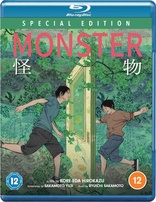Monster Blu-ray Movie
HomeMonster Blu-ray Movie 
怪物 | Kaibutsu | Special EditionPicture House Entertainment | 2023 | 127 min | Rated BBFC: 12 | Jun 03, 2024
Movie rating
8.1 | / 10 |
Blu-ray rating
| Users | 0.0 | |
| Reviewer | 4.5 | |
| Overall | 4.5 |
Overview
Monster (2023)
A mother demands answers from teacher when her son begins acting strangely.
Starring: Sakura Andō, Eita Nagayama, Mitsuki Takahata, Shidō Nakamura, Yūko TanakaDirector: Hirokazu Kore-eda
| Foreign | Uncertain |
| Drama | Uncertain |
| Thriller | Uncertain |
Specifications
Video
Video codec: MPEG-4 AVC
Video resolution: 1080p
Aspect ratio: 2.40:1
Original aspect ratio: 2.39:1
Audio
Japanese: DTS-HD Master Audio 5.1 (48kHz, 24-bit)
Japanese: LPCM 2.0 (48kHz, 24-bit)
5.1: 3552 kbps; 2304 kbps
Subtitles
English, English SDH
Discs
Blu-ray Disc
Single disc (1 BD)
Packaging
Slipcover in original pressing
Playback
Region B (locked)
Review
Rating summary
| Movie | 4.5 | |
| Video | 4.5 | |
| Audio | 5.0 | |
| Extras | 3.0 | |
| Overall | 4.5 |
Monster Blu-ray Movie Review
Reviewed by Dr. Stephen Larson July 12, 2024Winner of Best Screenplay and the Queer Palm at the 2023 Cannes Film Festival, Hirokazu Kore-eda's MONSTER has arrived courtesy of UK label Picture House Entertainment. Extras on this BD-50 comprise a 1+ hour documentary, omitted scenes, a screening Q&A, and a trailer. In Japanese, with two optional English subtitle tracks. Region "B" locked.
In his review of Well Go USA's "Region A" release of Monster, my colleague Jeff Kauffman makes some apropos comparisons with Kore-eda's latest feature to Rashomon (1950) and two versions of Lillian Hellman's play The Children's Hour directed by William Wyler. I knew little about Monster before watching it and when I did, I thought of Kurosawa's highly influential film since essentially the same story event is told from shifting perspectives. But Kore-eda and screenwriter Yūji Sakamoto do things rather differently here by not really employing subjective camera shots. In other words, there are few point-of-view shots taken specifically from the characters' eyes. Instead, director of photography Ryūto Kondō employs alternate camera angles, varying the types of shots when the film moves from one section to the next while recounting the same incidents.
Saori (Andō Sakura), a widow and the mother of 11-year-old son, Minato Mugino (Kurokawa Soya), decides to visit Minato's elementary school when he begins exhibiting peculiar forms of behavior (e.g., trimming his own hair, attempting to get out of the car when it's moving, et al.). Minato tell his mom that his homeroom teacher Mr. Hori (Eita Nagayama) has been teaching the class about how the brains of pigs are transplanted into humans. Minato also confides that Mr. Hori accosted him in class. Saori is none too pleased that the school's headmistress Fushimi (Yūko Tanaka) is not proactive in investigating her son's accusations. Mr. Hori and school administrators apologize and bow in deference to Saori but that's not nearly enough for her. The strong-willed mother is frustrated with Fushimi's placid demeanor and reluctance to discipline Mr. Hori. When the movie switches to the teacher's version, Mr. Hori claims that Minato hit on Yori Hoshikawa (Hiiragi Hinata), an odd allegation since the schoolmates are friends. Kore-eda and Sakamoto devote the third section to Minato and Yori's experiences together.
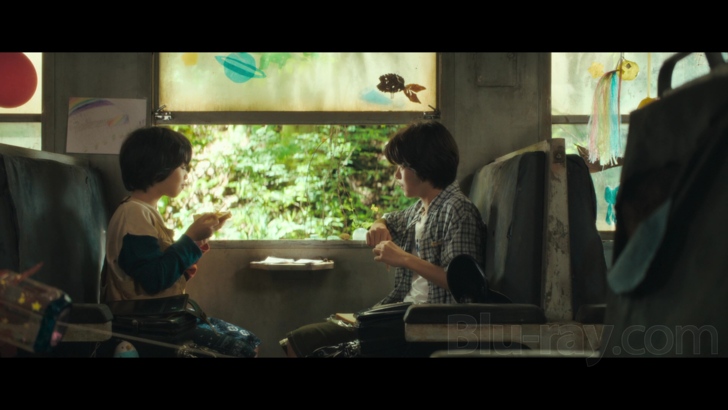
Monster marks a return for Kore-eda in exploring the ethical dilemmas and moral ambiguities of his characters. While the Japanese auteur can be said to do this in his films of the 2010s, here he probes those gray areas in much the same vein that he accomplished in his early work. I am reminded of his great film Distance (2001), which is still unfortunately seldom seen or discussed. Like Distance and his other films, Kore-eda doesn't signpost story events in his narratives with voice-overs, intertitles, or time markers. That's why re-watching his films is so rewarding. Each new viewing peels off layers that spectators don't catch the first or second time.
Monster Blu-ray Movie, Video Quality 
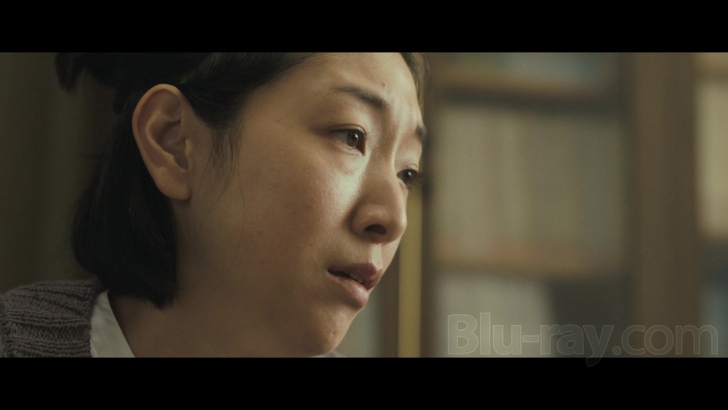
Picture House's recent release of Monster comes with a slipcover on this MPEG-4 AVC-encoded BD-50 (disc size: 46.3 GB). The movie appears in its original theatrical exhibition ratio of about 2.40:1. I consulted a camera website to verify that Monster was shot on the DJI Ronin 4D 4-Axis Cinema Camera at either 6K or 8K resolution. Cinematographer Ryūto Kondō utilized an LED light with 5300K. I'm unable to corroborate IMDb's listing that the DI was finished at 4K. I did upscale the Blu-ray's picture to 4K on my Sony player. Jeff remarked in his review that the Well Go transfer displays numerous dark scenes and gray ones, too, from the windy rainstorms shown in the film. That's evident here as well. My screen captures display a lot of the brighter-lit interiors and outdoor scenes with lush greenery. Kore-eda loves filming reflections of people, which dates to his fictional debut, Maborosi (1995). You can see reflections in glass and window in Screenshot #s 7, 11, and 15. The playground scene sports excellent color saturation (see frame grab #14). The encode is solid but not great. There's a scene where Mr. Hori visits the home of one of the schoolchildren, which reveals aliasing and banding. I played the scene in still mode and when jumping a frame ahead, I spotted shimmering around the panel of the window and slight banding along the wooden mailbox (see Screenshot #21). Picture House has encoded the feature at a mean video bitrate of 27985 kbps.
A mere eight chapter selections accompany the 126-minute film.
Monster Blu-ray Movie, Audio Quality 
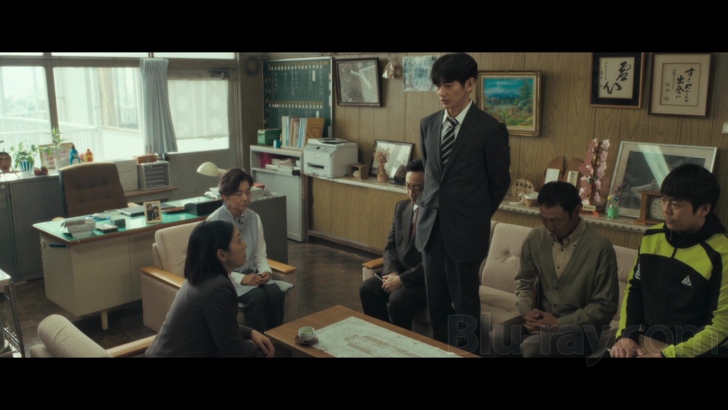
Picture House has supplied a Japanese DTS-HD Master Audio 5.1 Surround mix (3552 kbps, 24-bit) and a Japanese LPCM 2.0 Stereo option (2304 kbps, 24-bit). I tested the 2.0 and it contains the film's original sound track (not an audio description track in Japanese). I listened to the 5.1 mix twice. Spoken words carry a natural inflection and are delivered with clarity. In the elementary school scenes, I could hear sounds of doors opening and shutting as well as a door knock along both surround channels. Sirens blaring throughout the film's unknown city are occasionally prominent. Rainfall, wind rippling during a storm, and insects buzzing in the rural scenes are often active on the satellite speakers. Kore-eda told Lillian Crawford of Little White Lies magazine that he wanted to make frequent use of natural elements: "We were very careful in how we used the sounds of burning and of water and rain. I worked with the recording department to carefully differentiate between how and where we use those different nature sounds. Things like how the sound of footsteps changes in the tunnel, how space changes sound."
Music also plays a large role in the sound mix. A scene featuring a trombone and French horn sounds pretty loud along the fronts. Kore-eda has stated in various interviews I've read that he played a temporary score of Ryuichi Sakamoto's pieces in the film to complement the nature sounds. The late great Japanese composer was unfortunately too ill to write a full score but composed two original compositions I will describe in a moment. Sakamoto gave Kore-eda his blessing to insert preexisting pieces from some of his albums. For instance, Sakamoto's 2023 album 12 features rather minimalist piano chord ostinatos. One is downbeat while another boasts a rhapsody, which sounds like a Debussy piece at times. Kore-eda also incorporates two tracks from Sakamoto's 2009 album out of noise. A synth sounds like an accordion in the cue "hwit." "hibari" boasts brighter and happier music with continuous ostinatos. "Aqua" from the 1999 album BTTB is a gorgeous classical masterwork. Its placement in the film underscores Minato and Yori's bond as well as their freedom to roam through the wonders of nature.
Sakamoto's original piece for the movie, simply titled "Monster 1," comprises piano and a synth in low-key and reflective phrases. When I first listened to the piano bars in "Monster 2," the notes sounded similar to a famous score I've listened to on occasion. I knew later which one: The Mission (1986) and one of several themes that Ennio Morricone wrote for Roland Joffe's epic. I re-listened to the title track and "Falls" on the Virgin Records album and could hear the similarity. While the pan flutes, other woodwinds, and brass instruments Morricone wrote differ in tone and pitch from Sakamoto's piece, their musical notations and beats are strikingly similar. This is likely just a coincidence. Both pieces are pure beauty!
I watched Monster with standard English subtitles and the English SDH track. The latter does an effective job of denoting sound effects in brackets. The translation/transcription doesn't contain any typographical errors. The subtitle tracks default inside the image in a large sans serif font (see Screenshot #22).
Monster Blu-ray Movie, Special Features and Extras 
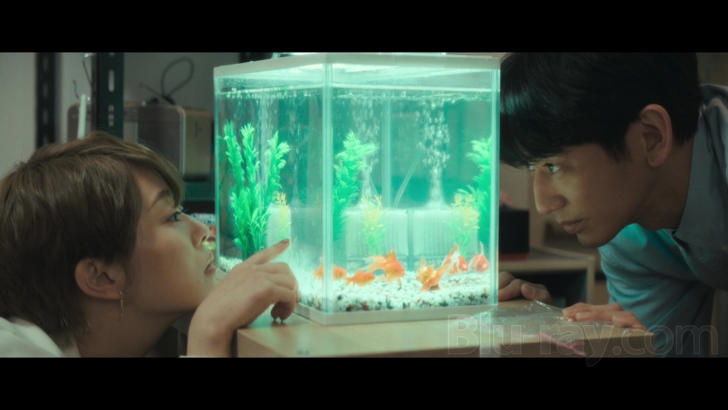
Picture House has licensed the same bonus features that are included on Hong Kong label Edko Films' Blu-ray. These likely originated from the Toho Blu-ray released early this year. On the back cover of the UK edition is this warning: Some special features may contain sequences of flashing lights which might affect viewers who are susceptible to photosensitive epilepsy.
- Unreleased Scenes & Clapperboard Collection (6:46, 1080p/i) - this is a rather odd way of presenting a compilation because the excised scenes are alternated with various footage of Monster's cast/crew gesturing towards the camera with a clapperboard. There are about ten deleted bits (i.e., very, very brief scenes). The most interesting is an encounter between Saori and Hori at a convenience store. Video look both progressively encoded and interlaced. I noticed some combing in at least one shot. In Japanese, with optional English subtitles.
- Making of Monster (1:06:13, 1080i) - this comprehensive making-of documentary produced by Toho begins with footage from the 76th Cannes Film Festival, followed by the awards ceremony. The doc shows the very first day of filming to the last days of the shoot. We get to see the auditions of first-time actors Soya Kurokawa and Hinata Hiiragi. In addition, the program covers script readings and a story conference. Especially interesting is how the crew constructed the abandoned train carriage along the disused railway track. There's a surfeit of B-roll and behind-the-scenes footage. Practically every scene filmed shows Kore-eda directing his actors. He tells Kurokawa repeatedly to act with subtlety because "the audience will figure it out." After the production wraps, there's footage of the first preview screening held on April 14, 2023. The narrator and all cast/crew members speak in Japanese. Picture House has subtitled all dialogue into English. The doc has six chapters, which are accessible via remote only.
- Cast & Crew at Monster Preview Screening (22:03, 1080i) - footage of an advanced screening held on May 8, 2023. Introductory remarks are offered by actors Sakura Andō, Eita Nagayama, Soya Kurokawa, Hinata Hiiragi, Mitsuki Takahata, Shidō Nakamura, as well as screenwriter Yūji Sakamoto and Kore-eda. The participants then present more detailed comments about making the film. Some of the actors had wanted to work with Kore-eda for a long time. Kore-eda speaks about how the story and script developed. He also discusses Sakamoto's music and he arranged to include it in the film. Cast and crew members speak in Japanese with optional English subtitles. (There are questions listed in Japanese at the bottom of the screen; they are not translated.)
- Theatrical Trailer (1:41, 1080p) - Picture House's official post-festival trailer for Monster, which is presented in 2.40:1 anamorphic widescreen with DTS-HD MA 5.1 Surround and LPCM 2.0 options. In Japanese, with burned-in English subtitles.
Monster Blu-ray Movie, Overall Score and Recommendation 
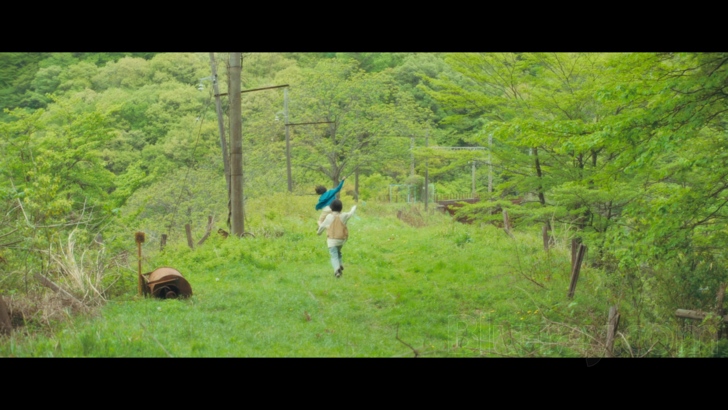
Hirokazu Kore-eda is one of Japan's greatest living directors and Monster is a testament to his venerable status as a cinematic humanist. While the narrative seems to sympathize the most with the two boys, it is also sympathetic to the plights of a teacher and headmistress as well. Picture House's "Special Edition" mostly lives up to its billing. While I would have liked to have seen longer deleted scenes and dailies (if they exist), the over hour-and-a-half worth of extras make this Blu-ray the best English-friendly package of the movie and an easy purchase. The a/v quality equals that on the Well Go release and surpasses it in quantity. A MUST OWN for fans of Kore-eda!
Similar titles
Similar titles you might also like

Shoplifters
万引き家族 / Manbiki kazoku
2018

Broker
브로커
2022

Memories of Murder
살인의 추억 / Sarinui chueok
2003

Michael
2011

Jeune & Jolie
Young & Beautiful
2013

Close
2022

Drive My Car
ドライブ・マイ・カー / Doraibu mai kā
2021

Tartuffe
Herr Tartüff / Masters of Cinema
1925

Murmur of the Heart
Le souffle au coeur / Dearest Love
1971

Tristana
Vintage World Cinema
1970

Perfect Days
2023

Phoenix
2014

The Handmaiden
아가씨 / Agassi | Special Edition
2016

Le Beau Serge
Handsome Serge / Masters of Cinema
1958

Parasite
기생충 / Gisaengchung
2019

Aparajito
অপরাজিত / The Unvanquished
1956

Leviathan
Левиафан / Leviafan
2014

Anatomy of a Fall
Anatomie d'une chute
2023

Mustang
2015

Blue Spring
青い春 / Aoi haru
2001
